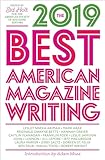The Best American Magazine Writing 2019 / ed. by Sid Holt.
Material type: TextPublisher: New York, NY : Columbia University Press, [2019]Copyright date: ©2019Description: 1 online resourceContent type:
TextPublisher: New York, NY : Columbia University Press, [2019]Copyright date: ©2019Description: 1 online resourceContent type: - 9780231190015
- 9780231548663
- 818.008 23
- online - DeGruyter
- Issued also in print.
| Item type | Current library | Call number | URL | Status | Notes | Barcode | |
|---|---|---|---|---|---|---|---|
 eBook
eBook
|
Biblioteca "Angelicum" Pont. Univ. S.Tommaso d'Aquino Nuvola online | online - DeGruyter (Browse shelf(Opens below)) | Online access | Not for loan (Accesso limitato) | Accesso per gli utenti autorizzati / Access for authorized users | (dgr)9780231548663 |
Frontmatter -- Contents -- Introduction -- Acknowledgments -- THE BEST AMERICAN MAGAZINE WRITING 2019 -- A Betrayal -- American Hustler -- A Kingdom from Dust -- Shallow Graves and An Interview with Ben Taub by Eric Sullivan -- The Genocide the U.S. Didn't See Coming -- We Made It. We Depend on It. We're Drowning in It. Plastic -- The First Porn President and I Believe Her and The Abandoned World of 1982 -- Misjudged -- The National Geographic Twins and the Falsehood of Our Post- Racial Future and The Profound Presence of Doria Ragland and The Ford- Kavanaugh Hearing Will Be Remembered as a Grotesque Display of Patriarchal Resentment -- This Place Is Crazy -- Getting Out of Prison Meant Leaving Dear Friends Behind -- Getting Out -- How to Be an Artist -- The Art of Dying Well -- Taming the Lionfish -- The Breakup Museum -- Skinned, by Lesley Nneka Arimah, and A Conversation with Claire Boyle and Karolina Waclawiak -- Permissions -- Contributors
restricted access online access with authorization star
http://purl.org/coar/access_right/c_16ec
The Best American Magazine Writing 2019 presents articles honored by this year's National Magazine Awards, showcasing outstanding writing that addresses urgent topics such as justice, gender, power, and violence, both at home and abroad. The anthology features remarkable reporting, including the story of a teenager who tried to get out of MS-13, only to face deportation (ProPublica); an account of the genocide against the Rohingya in Myanmar (Politico); and a sweeping California Sunday Magazine profile of an agribusiness empire. Other journalists explore the indications of environmental catastrophe, from invasive lionfish (Smithsonian) to the omnipresence of plastic (National Geographic).Personal pieces consider the toll of mass incarceration, including Reginald Dwayne Betts's "Getting Out" (New York Times Magazine); "This Place Is Crazy," by John J. Lennon (Esquire); and Robert Wright's "Getting Out of Prison Meant Leaving Dear Friends Behind" (Marshall Project with Vice). From the pages of the Atlantic and the New Yorker, writers and critics discuss prominent political figures: Franklin Foer's "American Hustler" explores Paul Manafort's career of corruption; Jill Lepore recounts the emergence of Ruth Bader Ginsburg; and Caitlin Flanagan and Doreen St. Félix reflect on the Kavanaugh hearings and #MeToo. Leslie Jamison crafts a portrait of the Museum of Broken Relationships (Virginia Quarterly Review), and Kasey Cordell and Lindsey B. Koehler ponder "The Art of Dying Well" (5280). A pair of never-before-published conversations illuminates the state of the American magazine: New Yorker writer Ben Taub speaks to Eric Sullivan of Esquire about pursuing a career as a reporter, alongside Taub's piece investigating how the Iraqi state is fueling a resurgence of ISIS. And Karolina Waclawiak of BuzzFeed News interviews McSweeney's editor Claire Boyle about challenges and opportunities for fiction at small magazines. That conversation is inspired by McSweeney's winning the ASME Award for Fiction, which is celebrated here with a story by Lesley Nneka Arimah, a magical-realist tale charged with feminist allegory.
Issued also in print.
Mode of access: Internet via World Wide Web.
In English.
Description based on online resource; title from PDF title page (publisher's Web site, viewed 02. Mrz 2022)


